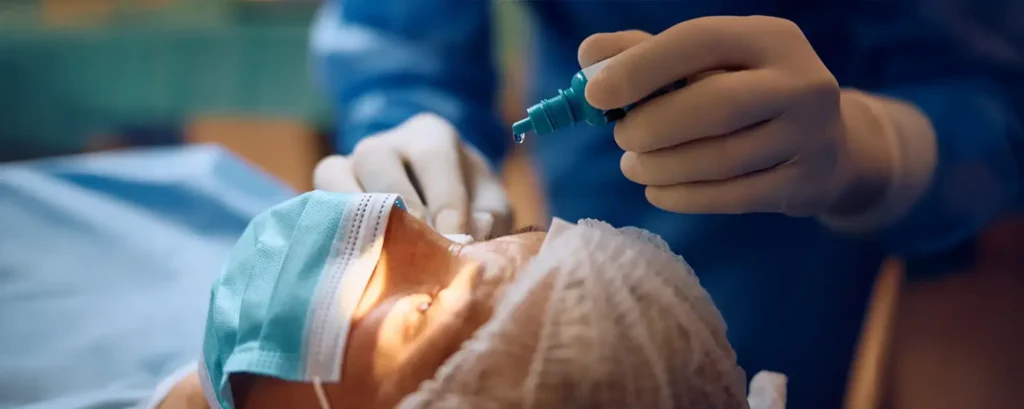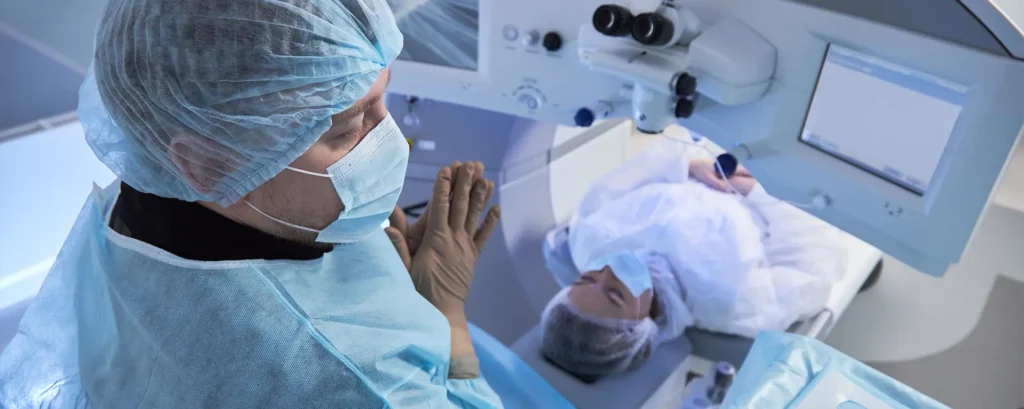Cataracts are one of the most common age-related eye conditions, and cataract surgery remains one of the safest and most effective operations performed anywhere in the world. But when you are taking regular medication for another health issue, the planning process can become more complex. One drug that sometimes raises questions is topiramate, often prescribed for migraine prevention and also for epilepsy. This medicine has several potential effects on the eye, some of which can be important when preparing for cataract surgery.
The good news is that most people taking topiramate can still have safe and straightforward cataract surgery. The key lies in awareness and planning. Your surgeon and anaesthetist will want to know about your medication history, they may carry out extra checks, and in some situations they may slightly adjust the timing or aftercare. This article walks you through what you need to know, explained in clear and simple terms.
Why topiramate matters in cataract surgery
Topiramate can cause a rare but well-documented reaction in the eyes known as a secondary angle closure. This happens because the drug sometimes leads to fluid build-up behind the iris, which pushes the lens and iris forward. The result can be a sudden increase in short-sightedness and a sharp rise in eye pressure. Although this complication is uncommon, it is relevant for anyone about to undergo cataract surgery.
Even if you have never had this side effect yourself, your surgical team still needs to take it into account. Cataract surgery involves calculating the correct lens power to implant in your eye, and those calculations depend on stable measurements. If topiramate has temporarily altered your eye’s focusing power or anterior chamber depth, your results could be less accurate. For that reason, surgeons prefer to check that your refraction is steady before going ahead.
Understanding how topiramate affects the eye

Topiramate is best known for its role in migraine and epilepsy management, but its effect on the eye can sometimes catch patients by surprise. The most frequent issue is a sudden myopic shift, meaning distance vision gets worse quite quickly while near vision may feel slightly better. This can be temporary and usually resolves once the drug is adjusted or stopped.
A second effect is secondary angle-closure glaucoma, which differs from the classic angle closure caused by pupil block. In topiramate’s case, the mechanism is a forward push from behind the iris–lens diaphragm. The pressure can build up in both eyes and may cause pain, halos, redness, or headaches. Because the mechanism is different, traditional treatments such as laser iridotomy are not effective here. Instead, the main approach is stopping the medication under medical advice and using drops that relax the ciliary body, together with steroids and pressure-lowering medicines.
Why surgeons ask detailed questions
During your cataract assessment you may be surprised by how detailed the medication history questions are. If you are taking topiramate, the surgeon will ask when you started it, whether you have had recent dose changes, and whether you have ever experienced sudden visual changes while on the drug. These questions are not just box-ticking. They help to build a clear picture of how stable your vision is and whether there is any risk of hidden effects on your eye’s measurements.
You may also be asked about other medical conditions, such as glaucoma or kidney stones, because these can interact with the way topiramate behaves in your body. If you are of childbearing age, your doctor may also confirm that you are following the safety guidance for topiramate and pregnancy, since this is tightly regulated in the UK.
Pre-operative checks
If you are on topiramate, your pre-operative assessment may involve extra steps. These often include:
- Checking your eye pressure carefully.
- Looking at the drainage angles of your eyes with a special lens.
- Confirming your glasses prescription has been stable.
- Repeating your biometric measurements if there has been a recent medication change.
None of this should be a cause for alarm. Instead, these checks are there to ensure that when you have your cataract removed and your new lens implanted, the results are as accurate and safe as possible.
Do you need to stop topiramate before surgery?
In most cases, no. The risks of suddenly stopping topiramate often outweigh the benefits. If you are taking it for epilepsy, stopping abruptly can trigger seizures. If you are taking it for migraine prevention, stopping may lead to a flare-up of symptoms. For these reasons, the general guidance is to continue the medication unless there is a very clear reason not to.
The exception is if you are actively experiencing topiramate-related eye problems. In that situation, the priority is to treat the eye, stabilise your vision, and only then proceed with surgery once everything is settled. Any decision to stop topiramate should always be made together with your prescribing doctor, not on your own.
Anaesthetic considerations

Cataract surgery is usually carried out with local anaesthetic and mild sedation. Topiramate can increase the effects of sedative drugs, meaning your anaesthetist may give you a lower dose or monitor you more closely. The drug can also cause a mild disturbance in acid–base balance in the body, especially when combined with other medicines such as acetazolamide. This is another reason why knowing your medication list is so important.
Your anaesthetist’s role is to keep you comfortable and safe during the operation. As long as they are aware you are on topiramate, they can easily adjust the anaesthetic plan to suit you.
After surgery and pressure management
Some people experience a short-term rise in eye pressure after cataract surgery. If you are taking topiramate, your surgeon may be more selective in which medicines are used to manage this. For example, they may avoid combinations that could increase the risk of acidosis or interact with your current treatment. In many cases, simple pressure-lowering eye drops are enough.
What matters most is that your surgeon will plan ahead. If your eyes have a history of topiramate-related angle closure, you will likely have an extra pressure check soon after surgery, just to be on the safe side.
When surgery might be delayed
There are only a few situations where your cataract operation might be delayed because of topiramate. These include if you are currently in the middle of an episode of drug-induced angle closure, if your glasses prescription is shifting rapidly due to recent dose changes, or if you are pregnant and taking topiramate. In these scenarios, stabilising your general health and eye condition comes first, and surgery is booked once things have settled.
Practical tips if you are on topiramate
- Always tell your surgical team you are taking the drug.
- Mention any recent changes in dose.
- Report sudden visual changes, eye pain, or halos immediately.
- Stay well-hydrated before and after surgery.
- Keep all your medicines listed and up to date at your appointments.
These simple steps make your surgery smoother and safer.
Frequently asked questions

1) Do I need to stop taking topiramate before cataract surgery?
In most cases you should continue taking it, as stopping suddenly can lead to serious health risks such as seizures or a return of migraines. Your cataract surgeon and anaesthetist will plan the operation around your medication, adjusting where necessary. The only time stopping might be considered is if you are in the middle of a topiramate-related eye complication, and even then it will always be done in consultation with your prescribing doctor.
2) Can topiramate change my glasses prescription before surgery?
Yes, topiramate can sometimes cause a sudden shift in your focusing power, making you more short-sighted than before. This change is usually temporary but it matters for cataract surgery because lens calculations rely on stable measurements. If your prescription has recently shifted due to topiramate, your surgeon may wait until things settle before confirming the lens power.
3) What symptoms should make me call my surgeon urgently?
If you notice a sudden change in distance vision, halos around lights, red or painful eyes, or a headache that feels different from your usual migraines, you should contact your eye doctor without delay. These can be signs of raised pressure in the eye, which can happen with topiramate, and early treatment makes a big difference to your recovery and safety.
4) Will the actual cataract operation be different because I am on topiramate?
The surgical steps are usually the same, but the preparation and aftercare may be adjusted. Your surgeon may carry out extra pressure checks, confirm your prescription has been steady, and keep a closer watch on you in the first couple of days after surgery. These changes are simply to make sure everything runs smoothly and to avoid surprises.
5) Can I still have a multifocal or toric lens if I take topiramate?
You can still be considered for these lenses, but your surgeon will want to see stable measurements before going ahead. If your prescription has recently shifted or if your eyes have had pressure issues, a simpler lens may be recommended to give you the most reliable outcome. The decision will always be made with your goals in mind and with clear advice about benefits and risks.
6) Do I need special eye drops before or after surgery because of topiramate?
Not usually, but your surgeon may choose drops carefully if your eye pressure needs controlling. Some pressure-lowering tablets can interact with topiramate, so in most cases topical drops are preferred. The choice of drops is tailored to your medical background and ensures that your eyes are kept comfortable and safe during recovery.
7) I take topiramate for epilepsy. Does this affect the anaesthetic?
It means your anaesthetist will plan your sedation carefully. Topiramate can increase the effects of some sedatives, so you may be given slightly lower doses and observed more closely. With this in mind, anaesthesia is still very safe, and your medical team will make adjustments to suit your individual situation.
8) Can topiramate itself cause cataracts?
There is no clear evidence that topiramate causes cataracts. The main concern is that it can affect the front of the eye, leading to temporary changes in pressure or focusing. Cataracts are usually caused by ageing, genetics, or other factors, and topiramate’s role is more about complicating the planning for surgery rather than creating the cataract itself.
9) I have a history of kidney stones. Does that matter?
Yes, it is relevant because topiramate can increase the risk of developing stones. Your surgeon and anaesthetist will advise you to stay well-hydrated and may avoid certain medicines that could add to this risk during surgery. It is another reason why providing your full medical history is so important in the planning stage.
10) Should I be worried about cataract surgery while on topiramate?
No, you should not be worried. As long as your surgeon knows you are taking topiramate and has checked that your vision is stable, cataract surgery can be carried out safely. The important part is communication: tell your team about your medication and report any sudden changes in your sight so they can take the right steps.
Final thoughts
If you are taking topiramate, cataract surgery can still be carried out safely in the vast majority of cases. The main message is to share information openly with your surgeon, report any sudden changes in your vision, and allow enough time for your eyes to be measured accurately. With careful planning and monitoring, there is no reason why being on topiramate should prevent you from enjoying the benefits of clearer vision after cataract surgery.
For more information or to discuss your individual situation, you can contact us directly at London Cataract Centre.
References
- Bharti, R. et al. (2022) ‘Topiramate-induced acute angle-closure glaucoma: a reversible cause of myopic shift’, Indian Journal of Ophthalmology, 70(5), pp. 1573–1576. Available at: https://journals.lww.com/ijo/fulltext/2022/05000/topiramate_induced_acute_angle_closure__a.12.aspx (Accessed: 20 August 2025).
- Vadrevu, K. et al. (2008) ‘Drug-induced ciliochoroidal effusion and secondary angle-closure glaucoma: a case series and review of the literature’, Survey of Ophthalmology, 53(6), pp. 422–431. Available at: https://pmc.ncbi.nlm.nih.gov/articles/PMC2687928 (Accessed: 20 August 2025).
- UK Clinical Pharmacy (n.d.) Peri-operative medicines handbook: Topiramate. Available at: https://periop-handbook.ukclinicalpharmacy.org/drug/topiramate/ (Accessed: 20 August 2025).
- Medicines and Healthcare products Regulatory Agency (MHRA) (2020) ‘Topiramate (Topamax): introduction of new safety measures including a pregnancy prevention programme’, Drug Safety Update. Available at: https://www.gov.uk/drug-safety-update/topiramate-topamax-introduction-of-new-safety-measures-including-a-pregnancy-prevention-programme (Accessed: 20 August 2025).
- Drugs.com (n.d.) Acetazolamide with Topiramate Drug Interactions. Available at: https://www.drugs.com/drug-interactions/acetazolamide-with-topiramate-86-0-2216-0.html (Accessed: 20 August 2025).

